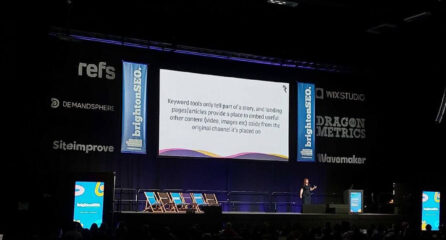If you’ve not been following SEO over the last few years, you could be forgiven for thinking that this article was an elaborate troll. For us insiders, though, the events of the last three years have been a baptism of fire, pushing our skills ever closer to the limit in ever more directions.
The simple truth of modern SEO is that it demands a more coherent, complete skillset than any other form of marketing.
It’s possible that even many SEO’s are unaware of the skills they’ve accumulated as a result of Google’s ever-tightening rules and regulations — so as a refresher, here’s what you’ve been learning over the last three years, and why this industry is one of the most demanding, challenging sectors in existence.
Note: The resources linked to in this article are a starting point. Once you’ve worked your way through them, you’ll still have a lot to learn!
Content
Of course, the content.
Phrases such as “great content” and “content is king” have become such clichés that at least three parodies of Matt Cutt’s use of the phrase have been made.
I’m not going to link them here because it’s SEO-based humour, and basing your humour on SEO is like basing a long-term relationship on a rigorous analysis of the chemical composition of your partner’s skin.
In fact, “content is king” has become such a cliché that major, supposedly trustworthy SEO blogs have generated huge amounts of traffic simply by arguing the exact opposite, arguing that content was at best some kind of uppity merchant wearing a hollowed-out turnip half. Starved for new information and exciting best practices, SEOs have flocked in droves to these posts which are – for want of a better term – great big fat lies.
Providing the most useful result on at least the first page, and ideally as the top result, is Google’s long-term aim. Creating content people genuinely find helpful is the inescapable first step to success, and will drive a certain amount of traffic regardless of promotion.
Writing
With content for SEO, you can’t write promotional copy or shallow articles, you have to deep-dive into your subject and emerge with a detailed, technical (but still accessible!) take on a (usually) obscure subject which no-one can pick holes in. Anything less is going to deliver lacklustre results – you’ve got to provide the best content in the industry, every time.
While working in SEO I’ve learned enough to talk about hardware architectures, fashion, sheds and the tech start-up scene for absolutely hours. This makes me a bad party guest, but an adequate SEO. Again, just adequate – the bare minimum requirement for an SEO is that they have a deep and fundamental understanding of your client, your client’s audience and your client’s product.
For many clients, you have to be able to wed the skills of a technical writer with the flair of a journalist just to get started with their specific SEO content.
It’s this meeting of technical understanding and artistic ability which makes SEO such an exciting field to work in, and SEO professionals some of the most inspiring people to work with.
Want To Be An SEO?
Start here: How To Write Longform Stories
Learn this: Reasoning, Data Analysis and Writing [Coursera]
Read these: Longform, The New York Times
Graphic Design
I’ve got to be honest, I’m really not a graphic designer. I just don’t have the talent for it.
Fortunately, this article isn’t about talent, it’s about skills, and skills can be learned!
In practice, as an SEO, you will definitely need graphic design skills over and over again as an essential part of your job. Whether you’re designing an image for a client, setting up a brief for a freelancer, or drafting an optimal checkout page layout, you’ve got to know your way around Photoshop or GIMP at the least, and Inkscape is a nice bonus.
You don’t need talent – although it helps! – what you need is an understanding of the principles that help graphic design succeed or fail. Understand why concepts like white space, skeuomorphism and kerning are important and you’ll be on your way.
As an SEO, you’ll often have different concerns than a real, talented graphic designer, too. Graphic designers will have half an eye on stylistic concerns and may experiment with original ideas. They can do this because they have the talent, and because they’ll benefit from being seen as an original and creative thinker – an SEO, typically, can’t and won’t.
For us, the absolute priority at all stages in graphic design is clarity, with originality and experimentation being dangerous at best.
Want To Be An SEO?
Start here: How To Design A Poster
Learn this: Design 101
Read these: (Article) Open Source Web Fonts, Eye Magazine
Web Design
Web design is a tough skill to learn in and of itself, incorporating front-end coding and graphic design principles. The SEO has to approach web design from perhaps the most technical angle, user experience and usability design.
This is because a poor user experience is usually fairly simple to spot in any kind of data set, with large numbers of site exits as users quit in frustration. You can bet that Google has far more sophisticated ways of spotting the same thing, and so poor user experience can seriously hurt your search rankings, while a great, engaging, interesting user experience can really help.
An SEO’s understanding of web design has to involve understanding JavaScript and its libraries (especially jQuery) well enough to know when front-end code is likely to impact site performance, as well as knowing what the code does.
You need to be aware of the reasons behind key design trends as well as the trends themselves.
You need to learn about general principles of consumer psychology as well as how to carry out specific usability testing.
All of this means that SEOs need to have a deep understanding of specific areas of web design, and in those specific area some SEOs may have more knowledge than professional web designers.
Want To Be An SEO?
Start here: Codecademy
Learn this: Responsive Web Design
Read these: Smashing Magazine, .Net Magazine
Research
Research skills are easy to learn and hard to master. Given the piles upon piles of resources available online absolutely free, the main problem is keeping the motivation to continue digging once you’ve got the ‘easy’ answer, but there is definitely more to the process.
As any History or Journalism major will tell you, the identification of trustworthy sources and detection of bias is a skill in itself. Beyond this, verifying your most trustworthy sources and learning to balance the merits of different arguments against each other will form the bulk of your research.
The best way to do this is by reading around the subject, and being actively engaged with the communities who are linked to your most common subject areas. Try visiting relevant subreddits, such as /r/investing or /r/askscience, or ask questions on Quora, or try StackExchange if you’re feeling especially brave.
SEOs need to be able to perform thorough research, as without good research the most attractive data visualisation will fall flat without a story, and the most insightful story will fall flat without facts and figures to back it up.
Want To Be An SEO?
Learn this: Data Driven Journalism
Read these: Nature, Popehat, /r/askhistorians
Public Relations
Alright, hands up all you SEOs who had never picked up a phone and called a journalist or industry expert before about two years ago. Now, keep your hand up if you have called a journalist or industry expert in the last two years!
Everyone who still has their hands in the air, I admire your enthusiasm but I really have to point out that I cannot see you, rendering this entire exercise largely futile. I apologise for wasting everyone’s time.
My point is that the SEO industry has plunged many of us headfirst into a challenging, demanding secondary industry that is itself in a period of massive flux. That’s really difficult!
What’s more, I see SEOs embracing the new role with great gusto, and a remarkable amount of respect and restraint. I’m seeing a lot of very successful PR campaigns that can be traced back to SEO companies making a mark in national newspapers, and that’s not possible with a crude fire-and-forget approach to PR.
In terms of social media (which I consider to be very much a part of PR), most SEO agencies are arguably ahead of their traditional PR counterparts, and they’re making more headway every day.
It’s quite an incredible achievement, and results so far are proving that good PR is an essential skill – not at all optional – when you’re an SEO.
Want To Be An SEO?
Start here: How To Sell A Story
Learn this: Public Relations [saylor.org]
Read these: Brand Republic, PR Week
Statistics
SEOs have a problem with data. They have too much of it.
If you build up enough different data sets across enough different dimensions (and this is a problem Big Data has as well), the chances of some of your results looking very significant when they’re actually just coincidence grow significantly.
If I’m analysing the effects of weather on Earth on ice-cream sales, I can see some data heavily implying that hot weather causes increased sales. If I’m analysing the effects of weather across all planets on the solar system on ice-cream sales, I can see that the weather on Venus has little effect on ice-cream sales. If I’m analysing the effects of weather across all planets throughout the galaxy, though, it looks as though there arehundreds of planets whose weather is linked to increased ice cream sales, just from chance.
Consequently, given the vast amount of data available to the typical SEO, there are false positives and deceptive correlations lurking around every corner.
In any given month, there will be at least one wildly viral post about SEO making a superficially convincing argument that factor x is the most important factor in ranking for term y. Yet the industry carries on much as it did before – why?
It’s not because the industry is wilfully oblivious. It’s because most SEOs have learned the important tools to analyse data thoroughly from necessity. If you believe everything out there about SEO, your site will end up a mess.
Some SEOs get by on a natural understanding of statistics – they can tell when something seems wrong, and explain flaws in data analysis with words and trends rather than mathematical analysis of their own. Many more do understand the maths behind the data, and this is by far the best way to do business.
Want To Be An SEO?
Start here: Common Mistakes In Statistics
Learn this: Statistics One [Coursera]
Read these: Significance, CrossValidated
Programming
Having an understanding of programming is really handy for SEO, as you’ll already have seen if you’ve followed all the links so far (don’t worry if you haven’t, it’s not necessary to understand this post).
R is fantastic for statistics and data analysis, Python is excellent for quick scripts and mini apps, and both of these are unusually important to SEOs. In most other domains, anything so simple that you can create a solution is already covered, but in SEO there’s always an opportunity.
Even better, understanding the back-end of a website can help you identify awkward site structures and potential 404s before they happen, enabling you to halt problems at source. Even even better, you can create your own complex websites and web apps that can provide valuable weight to your SEO campaigns – if you’re feeling ambitious.
Want To Be An SEO?
Start here: Codecademy
Learn this: Computer Science: Theory and Software Engineering [Coursera]
Read these: Joel On Software, A List Apart
Business
Any SEO needs that entrepreneurial spark, but they also need the skills to back it up.
To exploit the quick one-off opportunities and the giant gaps that still remain in the content marketing, you need to be able to create a business plan and stick to it. You need to be able to accurately and impartially pre-judge the ROI of an advertising campaign, and you need to have the guts to speculate in order to accumulate.
Building content is all well and good, but it’s slow work that’s quickly emulated by your lazier rivals. The bigger the barrier to entry the better, which means spending money. If you have to spend money to be sure of that traffic, you have to be able to judge the costs of that investment, both now and as an on-going, potentially growing concern.
The most successful SEOs always seem to have one or two side-projects on the go, and the skills required to spot and exploit those opportunities successfully are essential, even if you’re not going to spin them off into their own separate business.
Want To Be An SEO?
Start here: Think Like An Entrepreneur
Learn this: On Strategy [Coursera]
Read these: Penelope Trunk, Hacker News
What’s left? Oh, yeah –
The SEO!
Delving into relatively un-trodden areas of HTML in order to make your mark-up as semantically comprehensive as possible, getting to grips with schema.org and arcane issues of site structure, jumping down the throat of every 404 you encounter, checking the most obscure keyphrases in search of buried treasure…
What we think of as the ‘core skills’ of SEO, once we’ve carried out all the content marketing, design and statistical analysis, they’re really not the be-all and end-all of the SEO’s domain.
In fact, the exciting thing about SEO is that you can stretch it just about as far as you like. In my time as an SEO, I’ve run email marketing campaigns, worked on problems both back-end and front-end, phoned up journalists and academics, designed infographics… you get the idea. I’ve been busy. So have all of us!
So enough of the constant angst over the tiny black hat minority, enough of repentance for the sins of people we’ve never even met.
SEOs are the most multi-talented people in the entire marketing industry, and it’s time we started shouting about it!





